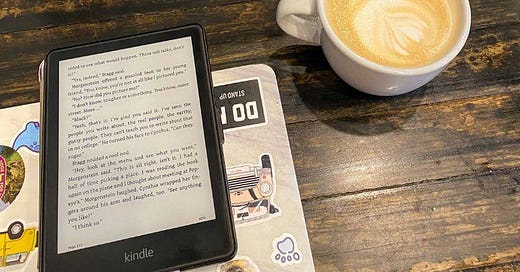Since May, I have read through every piece of my writing currently published on the internet. (With the exception of Instagram captions—most of them could be short blogs in their own right, maxing out the 2,200 character limit.)
I evaluated 330+ articles here on Paws and Reflect. Another 100 or so on Sniffspot. Dozens for Juniper. Several with Harper, a now-closed dog training app. Miscellaneous others. It started with a bid to spruce up my writing portfolio and became an obsession. I wasn’t able to focus on anything else—to write new pieces worth reading—until I understood where I’d come from.
This time travel carried me back to 2019. In my first post-college year I began feeling like a “real” writer, making “real” money for words on a page. I cried when my boss gave me a fresh business card inscribed “content specialist” instead of “account coordinator”. Momma, I made it! I captioned a photo of my desk in our family group message. I have arrived.
I hadn’t, of course.
I thought I was a good writer. Teachers and peers told me this from the fourth grade—I tied myself to a creative identity early and never loosened the knot. But white knuckles prevented me from taking a step back to actually view what I’d put into the world.
Thanks to Verlyn Klinkenborg’s Several Short Sentences About Writing and Stephen King’s On Writing and multiple clients decreasing budgets and editors ignoring freelance pitches (and a bit of existential dread), I finally let go enough to try seeing my work from the outside.
I hope all the slight edits and deep sighs and overthinking spirals in coffee shops from here to Canada have taught me things worth knowing. I think they have.
Goodbye, excess adverbs
Adverbs saturate my old pieces. Completely. Totally. Incredibly. They exist for a reason, sure—even the best writers don’t cull all their ly’s in the editing process—but I’d like to decrease my dependence on qualifiers.
“To be” or… to use a stronger verb
One root of my qualifier dependence: Weak verbs. Our language has thousands of action words to choose from. Why do I keep tripping over “to be”? Sometimes “is” and “were” and “am” are simple and clear. Often they’re dull. (And demand passive voice… another problem I know well.)
Recurring examples:
“I was excited” instead of “this excited me”
“I am overwhelmed” instead of “this overwhelms me”
What’s up with “that”?
This superfluous subordinating conjunction sneaks by me most of the time. I found it everywhere.
“I think that…” instead of simply “I think…”
“I worried that Scout didn’t trust me” instead of “I worried Scout didn’t trust me”
“So that I was…” instead of “so I was”
I’ve already removed four unnecessary “that”s in the writing of this quick post. Four in less than 500 words.
Breathe between shorter sentences
I love em dashes. My favorite internship boss—a badass freelance writer who taught me I could make a living with words—taught me that. (Semicolons held my fancy beforehand.)
But short sentences hit. Short sentences punch. And the more I question my dashes? The more I give up my fear of sounding stilted? The more I find a paragraph’s rhythm improved.
We love enthusiasm—but not everything needs exclamation
I’m an enthusiastic person. “Excitable” compliments me. I never want to lose that trait! But exclamation points, like adverbs, overstay their welcome in my old writing. They’re stronger when less ubiquitous.
Stop feeling so passive
Most unsavory patterns I noticed in my past work come back to one thing: a lack of confidence.
I felt passive voice absolved me of some responsibility for my words. Qualifying language supported my need for nuance. “Basically:” and “at the end of the day” summaries allowed me to ramble without guilt before a quick cleanup in the conclusion (often, the entire post should have been the final clear paragraph).
Is some of this just my voice? Yes. I’m uncomfortable writing with tight-spined authority. Softer prose reflects me. But some of it is a cop out, too. All that fear—of my audience, of my faults—made me more easily misunderstood.
Here’s to bravery.





